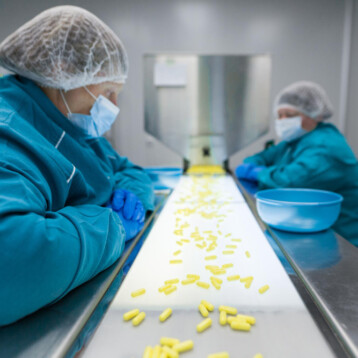Researchers from Tel Aviv University in Israel recently discovered that a commonly sold nutritional supplement made from beef, seafood or soy can delay several degenerative brain disorders including Parkinson’s disease.
A team of researchers from the Department of Human Molecular Genetics and Biochemistry in the Tel Aviv University (TAU) led by Prof. Gil Ast and Dr. Ron Buchner and recently discovered that a supplement known as phosphatidylserine can improve the function of specific genes involved in several degenerative disorders such as Riley–Day syndrom (familial dysautonomia) and Parkinson’s disease.
–
–
Phosphatidylserine includes certain molecules that are not manufactured by the human body but are necessary for the communication between nerve cells within the brain. In the past Phosphatidylserine was recognized by the U.S. Food and Drug Administration (FDA) for delaying memory loss in elderly people.
–
–
Phosphatidylserine was initially made from bovine brains but following the spread of BSE (mad-cow disease) during the 1990’s other sources for producing the substance were found including seafood and soy. The researchers from TAU used phosphatidylserine produced from oysters together with specific molecules that help the substance enter the brain. They have tested it on genetically engineered lab rats used as models for familial dysautonomia patients.
–
–
Familial dysautonomia patient’s brain does not manufacture a crucial protein known as IKAP. During their research the scientists demonstrated that phosphatidylserine can restore levels of the IKAP protein in vitro in Familial dysautonomia patient’s cells. Similar results were later shown in the lab rats used as models for familial dysautonomia patients. This was result was particularly encouraging since most medications which enter the blood stream can’t normally pass through the blood–brain barrier (BBB).
–
–
Currently a small scale research is ongoing at the New York University to test the effects of phosphatidylserine on the progress of familial dysautonomia patients. Following the initial lab results in rats, researchers are hopeful that phosphatidylserine can be used as a basis for future medications that can help millions around the world who are suffering not just from familial dysautonomia but from other generative brain disorders including Parkinson’s disease.
–
–
The research was recently published in the journal Human Molecular Genetics (see abstract).
TFOT already covered several new techniques for treatment of neurodegenerative disorders including gene therapy developed by researchers from the New York-Presbyterian Hospital/Weill Cornell Medical Center, and stem cells transplants.










